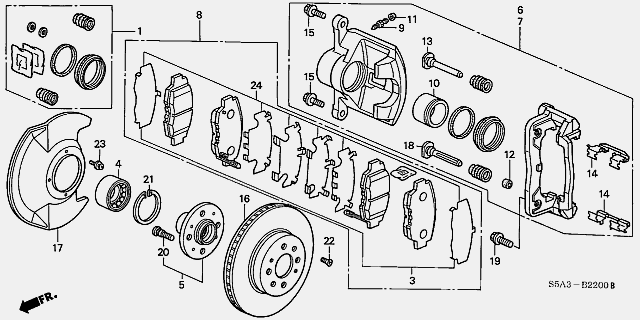Ok, my car has about 40k miles on it with the original pads. Lately I've noticed that it doesn't stop the way it used to. Seems to take more distance although it still stops pretty good, or at least compared to the brakes on my mom's Camry. They've never been looked at so I don't know how much life is left. I want to wait till 50k to do it but I'm not sure they will last until then and I don't want to find out the expensive way. I think they will last until winter break though which should be around 42-43k miles. From some of the posts here, a brake job 'sounds' like an easy diy so I just wanted to make sure that it wouldn't be one of those things where I take the thing off and end up not being able to put it back together. So from a scale of 1-10 with 1 being easy as an oil change and 10 being a timing belt job, where would a brake job fall?
Also I was looking at brake pads on Rockauto and came across Wagner Thermoquiet and Edge pads w/ a $15 rebate per set. So including shipping, the Termoquiet pads are about $40 - $15 rebate = $25 and the Edge pads are about $10 more. Are they any good? Which one is better? I would like the Akebonos but I can't justify the extra cost since the Wagners seem like decent pads that would suit my needs. The car is an 04 Civic btw. I might replace the rotors instead of getting them turned, too much of a hassle to have to take them to a shop. Would the cheapest Beck/Arnley rotors from Rockauto do? With the Thermoquiet and cheap rotor combo and shipping and the $15 rebate, the parts should come out to be around $90. Sound reasonable?
Also, is it possible to check the pads while I'm under the car doing an oil change without taking the wheels off? I want to make sure this isn't just in my head, and maybe my sisters too since she also said something about it the other day.
On the other hand my mom's Camry just got a front and rear brake job with a fluid flush for $363 at an independent shop, and he used Wagner Thermoquiets. Debating whether I'm brave enough to give it a shot. Hmmm...never intended this to turn into the length of a short story. Thanks in advance for opinions.
Also I was looking at brake pads on Rockauto and came across Wagner Thermoquiet and Edge pads w/ a $15 rebate per set. So including shipping, the Termoquiet pads are about $40 - $15 rebate = $25 and the Edge pads are about $10 more. Are they any good? Which one is better? I would like the Akebonos but I can't justify the extra cost since the Wagners seem like decent pads that would suit my needs. The car is an 04 Civic btw. I might replace the rotors instead of getting them turned, too much of a hassle to have to take them to a shop. Would the cheapest Beck/Arnley rotors from Rockauto do? With the Thermoquiet and cheap rotor combo and shipping and the $15 rebate, the parts should come out to be around $90. Sound reasonable?
Also, is it possible to check the pads while I'm under the car doing an oil change without taking the wheels off? I want to make sure this isn't just in my head, and maybe my sisters too since she also said something about it the other day.
On the other hand my mom's Camry just got a front and rear brake job with a fluid flush for $363 at an independent shop, and he used Wagner Thermoquiets. Debating whether I'm brave enough to give it a shot. Hmmm...never intended this to turn into the length of a short story. Thanks in advance for opinions.
Last edited:


